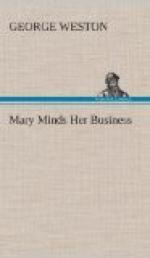A freight train was disappearing into one of the warehouses. Long lines of trucks stood on the sidings outside. Wisps of steam arose in every direction, curious, palpitating.
From up the river the roar of the falls could just be heard while from the open windows of the factory came that humming note of industry which, more than anything else, is like the sound which is sometimes made by a hive of bees, immediately before a swarm.
It was a scene which always gave Josiah a well-nigh oppressive feeling of pride and punishment—pride that all this was his, that he was one of those Spencers who had risen so high above the common run of man—punishment that he had betrayed the trust which had been handed down to him, that he had broken the long line of fathers and sons which had sent the Spencer reputation, with steadily increasing fame, to the corners of the earth. As he walked down the hall that Saturday morning, his sombre eyes missing no detail, he felt Mary’s fingers tighten around his hand and, glancing down at her, he saw that her attention, too, was engrossed by the scene below, her eyes large and bright as children’s are when they listen to a fairy tale.
Arrived at the office, he placed her in a chair by the side of his desk, and you can guess whether she missed anything of what went on. Clerks, business callers, heads of departments came and went. All had a smile for Mary who gravely smiled in return and straightway became her dignified little self again.
“When is Mr. Woodward expected back?” Josiah asked a clerk.
“On the ten-thirty, from Boston.”
This was Stanley Woodward, Josiah’s cousin—Cousin Stanley of the spider’s web whom you have already met. He was now the general manager of the factory, and had always thought that fate was on his side since the night he had heard of Martha’s death and that the child she left behind her was a girl.
Josiah glanced at his watch.
“Time to make the rounds,” he said and, lifting Mary on his arm, he left the office and started through the plant.
And, oh, how Mary loved it—the forests of belts, whirring and twisting like live things, the orderly lines of machine tools, each doing its work with more than human ingenuity and precision, the enormous presses reminding her of elephants stamping out pieces of metal, the grinders which sang to her, the drilling machines which whirred to her, the polishing machines which danced for her, the power hammers which bowed to her. Yes, and better than all was the smile that each man gave her, smiles that came from the heart, for all the quiet respect that accompanied them.
“It’s his daughter,” they whispered as soon as Josiah was out of hearing. Here and there one would stop smiling and say, “I remember the day he brought her mother through—”
At the end of one of the workshops, Mr. Spencer looked at his watch again.
“We’d better get back to the office,” he said. “Tired, dear?”




